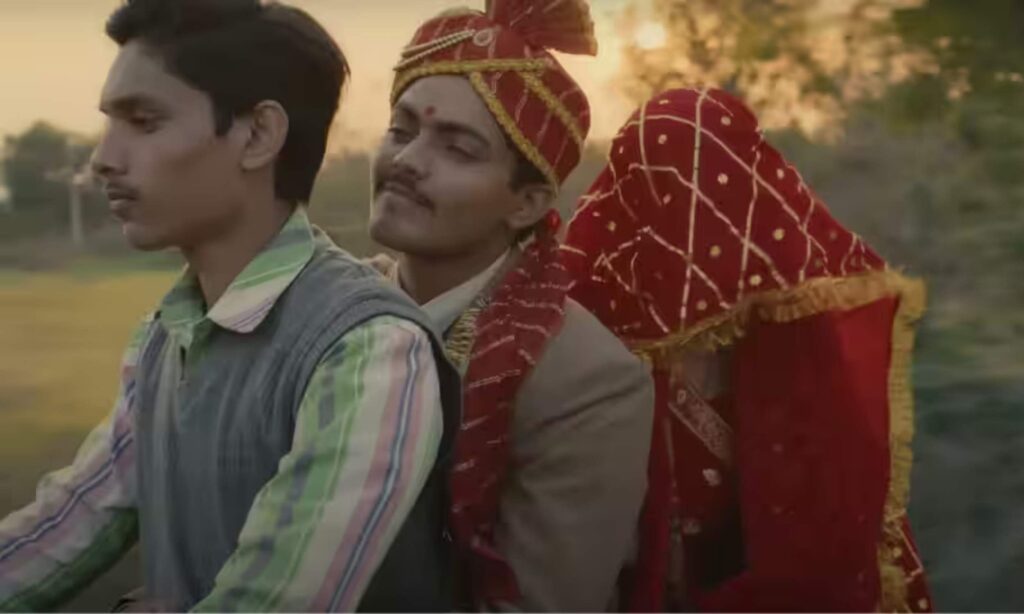Simplicity might be a structure easy enough to scorn but if the director knows how exactly to engage the audience, it could be proof of heartwarming, rock-solid storytelling. Kiran Rao’s Laapataa Ladies manages this quite well.
Laapataa Ladies, set in a fictional state in rural India, Nirmal Pradesh, looks at two newlywed brides, Phool (Nitanshi Goel) and Jaya (Pratibha Ranta), who get swapped on a train. The mix-up occurs as Phool’s husband, Deepak (Sparsh Shrivastava), in a hurry to get home, mistakenly bring Jaya home. The bridal veil, covering the women’s faces in entirety, is effectively the singular marker that not only cause the error but also robs the women of their individualism after their marriages. Thankfully, the film grants individualism and agency to them by slowly untangling their narrative fates and languidly letting the plot amble along organically.
This is both a flaw and a boon for Laapataa Ladies. Rao and screenwriters Biplab Goswami, Divyanidhi Sharma, and Sneha Desai are not interested in just satirizing and commenting on the buffoonery of patriarchy as well as the fixed slotting of roles for women within the family unit. They choose to let the plot develop somewhat in a serene fashion. Setting the film in 2001 makes for a clever screenwriting hack as technological advances of today would solve the mystery almost immediately. At the same time, women continue to be victims of patriarchy now just as they were then. Phool’s journey of being left alone on the train by her newlywed husband and her choosing to stay back at the station with a group of misfits is her journey of finding independence. It is contrasted as well as complimented with Jaya’s story of finding herself stuck in Phool’s place as the newlywed bride of Deepak and having to make lemons out of lemonade. This, while also trying hard to take back control of her life and slowly but steadily creating a new, familial unit in the process. Both Phool and Jaya are lost not just literally but also figuratively, having to navigate through the strange comedy of errors they find themselves in.
In the background, the main plot of the investigation of these ‘lost ladies’ gets fully underway once corrupt cop, Manohar (Ravi Kishan), enters the fray and is fascinated not by the disappearance of Phool but by the appearance of Jaya in Deepak’s life as well as the village of Suryamukhi, meaning sunflower. It’s almost like the character arc of Manohar mirrors the blossoming of the individual into a character slowly tending toward incorruptibility , albeit not without its share of contrivance. It is no coincidence that both the village as well as the names of the two women signify blooming or coming of age.
No doubt, Rao’s story is predictable. But thankfully, it doesn’t subtract from the charm of the storytelling and the simple yet deft manner in which Laapataa Ladies chooses to tug at your heartstrings. There is a healthy smattering of social messaging, which does tend to become preachy as the movie progresses towards its finish line. But what truly lifts Laapataa Ladies a notch or two is Rao’s softer touch in the lighter moments and sharp observations of rural and small town life. The comedic moments are mostly situational-based, and handled delicately without becoming over-the-top or cringy.
The treatment of heartland India reminds you of some of the Ayushmann Khurrana-led small town vehicles, at least during their early days. While Laapataa Ladies doesn’t completely evoke the novelty of those films, it does remind you of the potency of their simplicity. It works well enough that you can almost forgive the movie for feeling like it is stuck in a holding pattern during the second act. This is partly because Jaya’s story thread feels significantly more interesting and important from the writers’ perspective, risking making Phool’s journey comparatively ancillary. However, the performances by Nitanshi Goel as Phool, Sparsh Shrivastava as her lovelorn husband Deepak, Pratibha Ranta as Jaya, and Ravi Kishan as Manohar truly excel and make Rao’s world feel lived in with all its idiosyncrasies. They make sure even the overblown background music, announcing or underlying in triplicate the film’s comedic moments, get cancelled out. The rest of the technicalities, though, are restrained, largely unobtrusive and go well with the narrative flow of the film.
One could argue that Rao’s treatment in her second feature is relatively more ‘mainstream’ than her debut, Dhobi Ghat (2011). Yet, there is no doubt that the film has restraint, is perceptive and heartwarming. Rao proves that in avoiding storytelling that is overfilled with complexities and pretensions, simplicity can be winsome.
Hindi, Drama, Comedy, Color



Kiran Rao’s #LaapataaLadies beautifully captures the essence of rural India! 🌻 The film’s subtle storytelling and heartwarming narrative make it a must-watch! Can’t wait to experience this journey on screen! 🎬💫